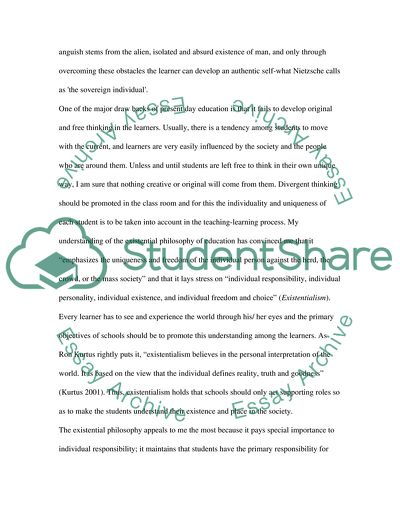Cite this document
(My Personal Philosophy of Teaching within Education- Existentialist Essay Example | Topics and Well Written Essays - 1250 words, n.d.)
My Personal Philosophy of Teaching within Education- Existentialist Essay Example | Topics and Well Written Essays - 1250 words. https://studentshare.org/education/1719127-my-personal-philosophy-of-teaching-within-education-existentialist
My Personal Philosophy of Teaching within Education- Existentialist Essay Example | Topics and Well Written Essays - 1250 words. https://studentshare.org/education/1719127-my-personal-philosophy-of-teaching-within-education-existentialist
(My Personal Philosophy of Teaching Within Education- Existentialist Essay Example | Topics and Well Written Essays - 1250 Words)
My Personal Philosophy of Teaching Within Education- Existentialist Essay Example | Topics and Well Written Essays - 1250 Words. https://studentshare.org/education/1719127-my-personal-philosophy-of-teaching-within-education-existentialist.
My Personal Philosophy of Teaching Within Education- Existentialist Essay Example | Topics and Well Written Essays - 1250 Words. https://studentshare.org/education/1719127-my-personal-philosophy-of-teaching-within-education-existentialist.
“My Personal Philosophy of Teaching Within Education- Existentialist Essay Example | Topics and Well Written Essays - 1250 Words”. https://studentshare.org/education/1719127-my-personal-philosophy-of-teaching-within-education-existentialist.


